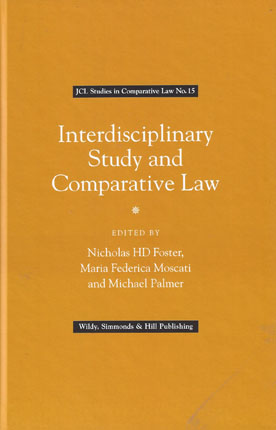We are now closed for the Christmas and New Year period, returning on Monday 5th January 2026. Orders placed during this time will be processed upon our return on 5th January.

This book, which is dedicated to the memory of distinguished scholar Professor Simon Roberts, is a collection of essays exploring themes and issues in the relationship between comparative legal studies and other disciplines in the social sciences and humanities.
Law does not exist in a vacuum, and an appreciation of the social, cultural and other factors affecting it may often be helpful for a sounder understanding of its nature and significance, especially when law is considered in a broader, comparative, context. Insights drawn from other disciplines may therefore be especially appropriate for comparative legal studies, but the use of those insights raises various questions, such as the manner in which other disciplines—given their own distinctive concerns and modes of analysis—characterise the nature and significance of law and legal institutions.
Interdisciplinary study also encourages us to ask how cognate disciplines and their arguments are seen, used and maltreated in comparative legal studies, as well as the pitfalls which await scholars from other disciplines who venture into law.
The essays in this collection offer a unique contribution to these and other aspects of the use of interdisciplinarity in comparative law.
The contributors cover a broad range of disciplines and topics. Nicholas Foster, Maria Federica Moscati and Michael Palmer offer some general observations; Eric Heinze examines basic theoretical problems of comparative law by analogy to a comparative literary model; Jaakko Husa considers the nature and problems of ‘Interdisciplinary Comparative Law’; Dionysia Katelouzou explores the value of quantitative methods drawn from the fields of economics and finance; Karen McAuliffe examines issues of law, language and translation
Fernanda Pirie considers the significance of historical studies for anthropological understandings of non-state law; Marian Roberts examines the influences of interdisciplinarity on the development and practice of UK family mediation; Mathias Siems speaks to the use in comparative legal studies of insights drawn from other comparative disciplines; Florian Wagner-von Papp explores issues in the relationship between comparative law and economics, while Gary Watt contrasts economics-based interdisciplinarity to the humanities
approach;Simon Roberts draws on anthropological approaches to negotiation for understanding civil justice issues; and Sir Ross Cranston reflects on the value of an important area of Simon Roberts’ interdisciplinary work.